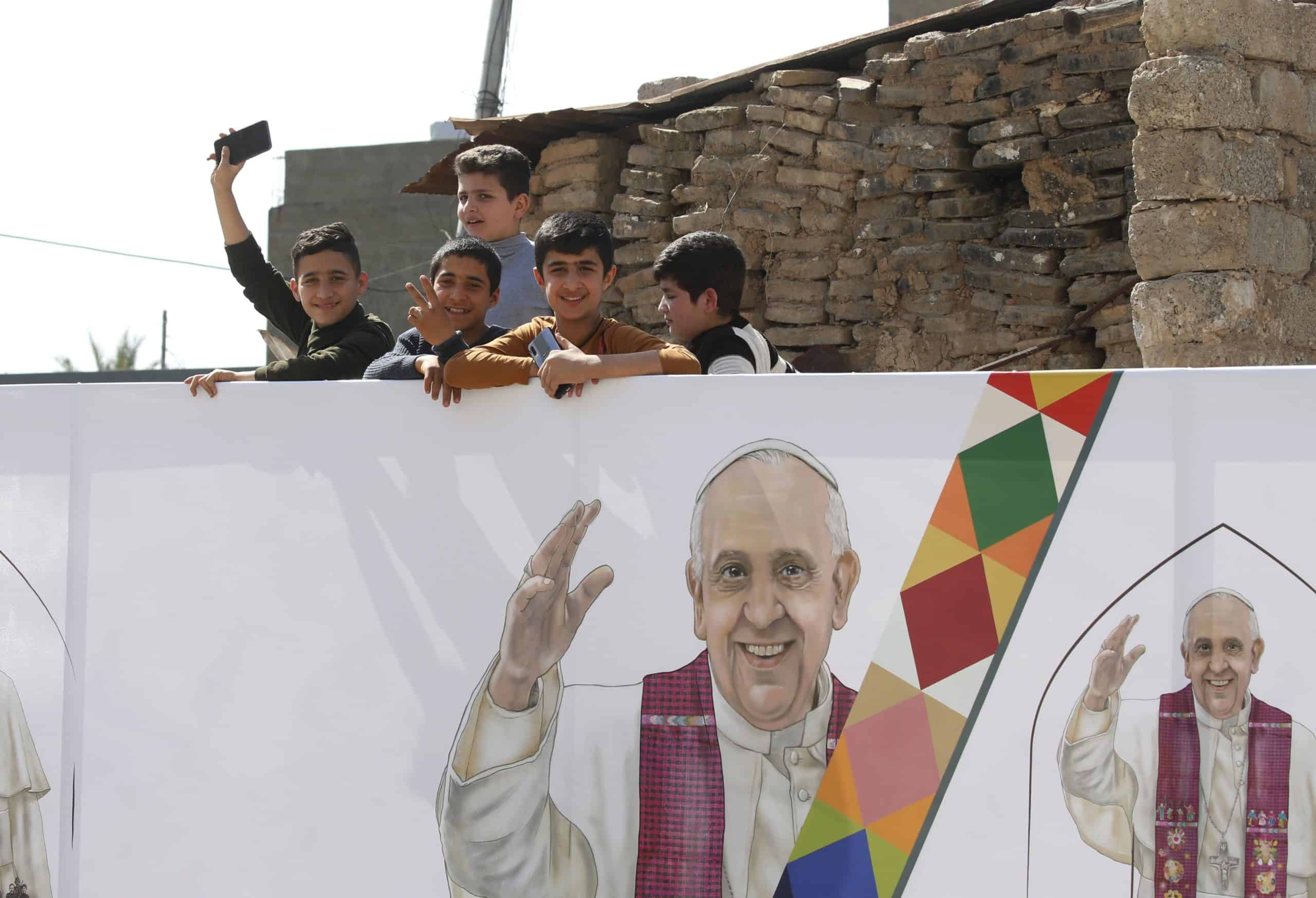In one of the landmark moments of his trip to Iraq, Pope Francis stood in front of the rubbled-remains of one of the largest churches in Mosul, the one-time capital of the ISIS caliphate. Speaking to an audience including representatives of varying religious beliefs, Pope Francis declared that fraternity was stronger than fratricide, hope stronger than death, and peace stronger than war. It was a bold declaration, but one that met with the receptive ears of those who have already started the difficult work of reconciliation. His visit gave encouragement to me and my colleagues at the Jesuit Refugee Service (JRS) in Iraq, some of whom experienced displacement themselves.
Sarah, whose name is changed here for anonymity, is a Syriac Catholic from Qaraqosh, a Christian-majority town close to Mosul. On the night of August 6th, 2014, her brother’s phone rang. Whispered words in the dark relayed the terrifying news that the arrival of ISIS was imminent. Remaining in Qaraqosh under ISIS rule meant forced conversion, being financially extorted under the cover of the jizya tax for non-Muslims or being subject to slavery, rape, or murder. Given these options, Sarah and her family fled, along with nearly one hundred thousand others from the Ninevah plains to Iraqi Kurdistan. Some were able to drive while the remainder walked. Most people fled with only the clothes on their backs.
Once in Iraqi Kurdistan, the increased security of their situation came with great hardship. Some families lived in houses and trailers rented by churches and others occupied unfinished buildings and pitched tents. There were the daily struggles for food and medical care, as well as the continuous threat of violence and further displacement. It wasn’t until October 2016 that Qaraqosh was liberated in the Battle of Mosul, and people did not return right away.
From October 2014 to September 2017, JRS accompanied displaced people from Qaraqosh in Ankawa and Ozal City, in Erbil, the capital of Iraqi Kurdistan and the villages surrounding Duhok, a city in Kurdistan, northwest of Qaraqosh. When Pope Francis celebrated mass in Erbil this past Sunday, he acknowledged those who “bear the wounds of war and violence, wounds both visible and invisible!”According to its national director, Fr. Joseph Cassar SJ, JRS Iraq tended (and continues to tend) these wounds through three values: to uphold and restore the dignity of forcibly displaced persons, to show compassion to the most vulnerable, and to be a sign of hope that a shared future is possible. Each of these values addressed the underlying wounds—the stripping of dignity, the hardness of heart that ignored the other’s humanity, and the impulse to eradicate the other’s differences through violence.
In October of 2014, a friend introduced Sarah to JRS and she started volunteering with a team that embodied these ideals. They visited families and assessed their needs. She had a history of working with youth, and the plight of young people living in cramped quarters moved her. In the limbo induced by displacement, the education of children had been put on hold. Youth felt hopeless about their future prospects, and like all of the adults, they were still coping with the trauma of displacement. Sarah’s volunteering turned into full-time work and a vocation. The feedback of Sarah and others led JRS to develop education programs for children and vocational skills training for adults in areas as varied as sewing, computer skills, and English. JRS also provided mental health support and food baskets to those most in need.
When most of the displaced people from Qaraqosh returned home, JRS followed, and continues to provide services of education, mental health support, direct aid, and vocational training. Though the war against ISIS has theoretically ended, the people of Qaraqosh face many challenges. The pandemic compounded an already-dire economic situation, and the entire country faces challenges in providing adequate educational and social support for its people. As returnees rebuild their city, JRS strives to “build people up”, as Sarah says, after the losses of the last five years.
After COVID-19 lockdown prohibited most in-person activities, staff at JRS hand-delivered medicine to the infirm, food to the hungry, and coloring-books to children. Being a sign of hope comes in being present to underserved people, but also in showing that it is possible for people of different religions and ethnicities to work together. Sarah shares that her own Christian faith moves her to care for others, regardless of their faith. “Jesus told us to love,” she says.
Sarah’s colleague Hussein, who is Kurdish and Sunni Muslim, takes heart that the staff of JRS Iraq comes from a variety of backgrounds to serve those in need. “In a land known more for its conflict,” he says, “we can show that different beliefs are not obstacles to harmony.”
Fadi, a Christian who runs one of the JRS projects in Qaraqosh, described Pope Francis coming to Iraq as a dream. He expressed hope that the Pope’s message of fraternity could help all Iraqis to work together for the common good. When Pope Francis was in Qaraqosh, he visited the Cathedral of the Immaculate Conception, the largest church in Iraq. He prayed the Angelus with the community, and heard testimonies of those who fled in 2014, including a woman whose son and nephew had been killed but found the power to forgive.
From a place that had witnessed great violence, the Pope emphasized the call to fraternity, and spoke about the importance of forgiveness. In his address to youth he begged them, “Do not stop dreaming! Do not give up! Do not lose hope!” It is a message that resonates with those of us who are privileged enough to work with the displaced.


